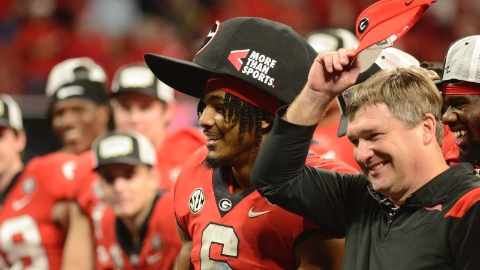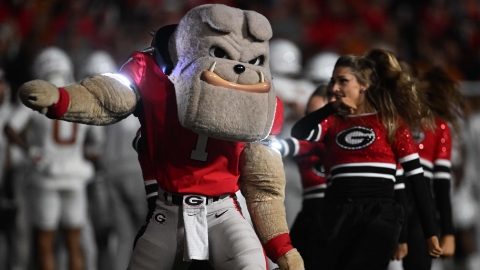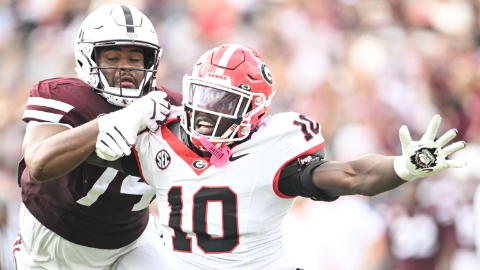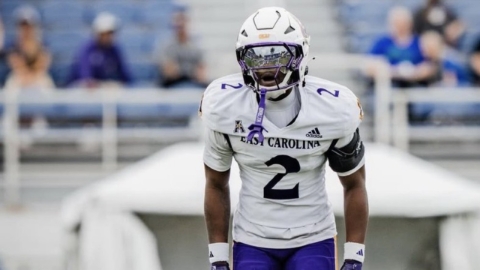D'Andre Swift's Opportunity to Learn
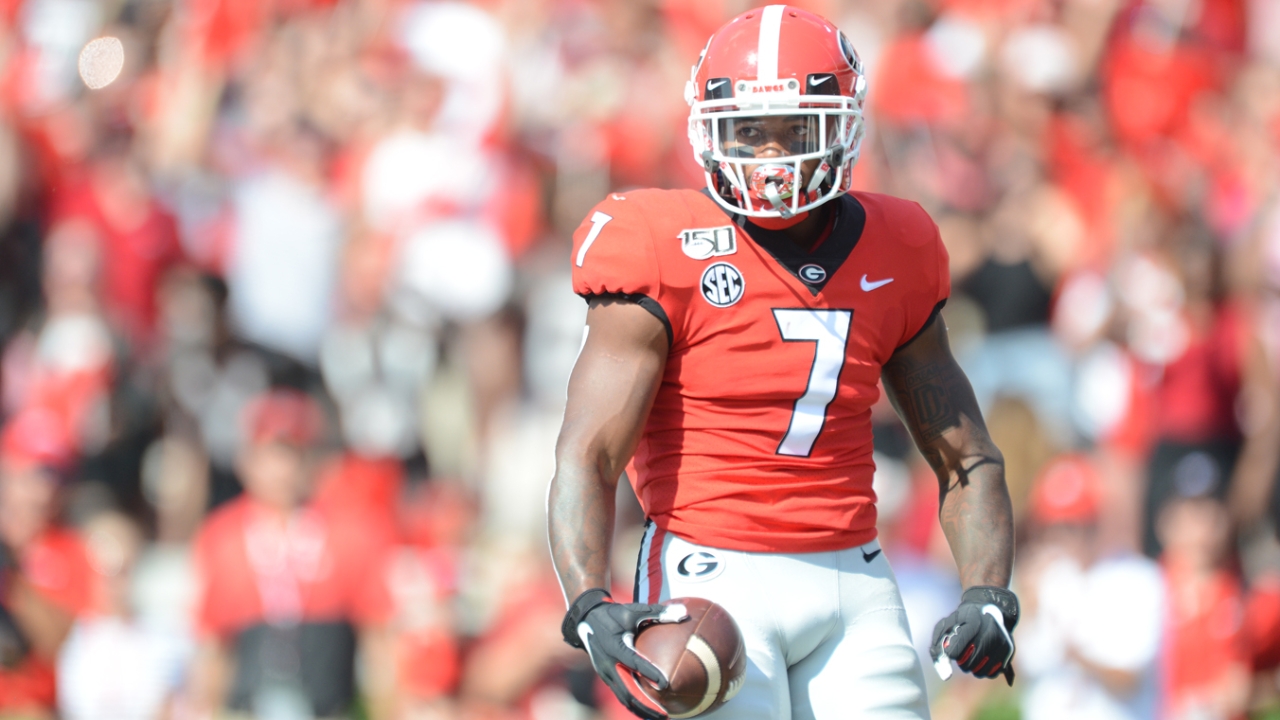
PHILADELPHIA - It was a little more than two weeks before Georgia’s Liberty Bowl matchup against TCU. Everything looked on-track for D’Andre Swift, then a high school senior, to come in and be Georgia’s feature back in 2017 as a freshman.
But on December 15, that track altered greatly.
“To bypass the year and go chase something that's hopefully going to always be there for me,” Nick Chubb said then. “Bypassing hanging out with my friends, and the brotherhood we have here, I couldn't pass up my senior year.”
Up with him at the podium was Sony Michel, there to announce the same thing.
In the blink of an eye, Swift had gone from having the opportunity to come in and be Georgia’s go-to running back as a freshman, to being pushed back to third-string, at best.
To the Swift family, it was a bit of a blindside. When he had committed in September of that year, Chubb and Michel weren’t a part of the equation.
“When we chose Georgia, Nick and Sony were supposed to be going to the NFL,” Darren Swift said. “So, at first, we didn’t really think about them.”
The news had reverberated around all of college football. Two pro-caliber running backs had announced they were returning to a school that already had a five-star running back commit.
Coaches of other teams salivated. It had looked like the D’Andre Swift sweepstakes was back on.
“My phone started ringing all over again from college coaches,” Darren Swift said.
But when he would pick up, he gave a simple answer that not many folks expected: “No, we’re good.”
Huh?
“We’re staying.”
It caused confusion. Not only to coaches, but other family members, friends, who were questioning the decision of the Swifts. But there wasn’t any moment of hesitation for them during all of this—Swift was going to be a Bulldog.
They didn’t see it as a loss of an opportunity, rather an opportunity gained. With Michel and Chubb staying in Athens, Swift would have little weight on his shoulders. Come in and carve out a role for himself—that’s what he needed to do.
“It allowed him to learn the game at his pace,” Darren Swift said. “It was fast enough to where he could still participate and produce, but slow enough to where he could come along slowly; much slower than if Nick and Sony weren’t there.”
To a lot of players, the presence of those two might scare them off. Recruits want to play early, and with Chubb and Michel there, the chances of that were slimmed greatly for Swift.
But it was a case all too familiar to Swift, one that he saw entering his freshman year at St. Joseph's as well.
Even with all the hype that surrounded the then 14-year-old Swift, St. Joseph's already had established skill players on the offensive side of the ball: Olamide Zaccheaus, then St. Joseph's starting running back and now Virginia’s all-time leader in receptions and a current member of the Atlanta Falcons, and John Reid, a St. Joseph's receiver and a current corner at Penn State.
The feeling for Swift was different, then. He felt like the energy and prowess he brought to youth ball needed to carry over to high school football right off the bat. He didn’t want a transitional period—he wanted domination.
The spin moves, jukes, dead-legs, Swift would try and break out his entire arsenal of moves. Except it wasn’t always necessary. He wasn’t St. Joseph's only option, but he felt like he was, early on.
“He would be tough on himself as a freshman thinking he needed to be the guy,” Roken said. “He had to understand that he didn’t need to be the guy every single time.”
In those first few weeks, Sugden would remind him to believe in the plan they’d laid in place.
“Just trust me to the line of scrimmage” Sugden would tell Swift. “After that, it’s all you baby.”
When Swift picked up on both those lessons, he grew exponentially. He was able to see what made guys like Zaccheaus and Reid successful on the field and pair that knowledge with his undeniable quickness.
More importantly, Swift was able to learn where he could compliment Zaccheaus and Reid best and contribute as a freshman. While teams were focusing on the two established stars of the Philadelphia Catholic League, they would often overlook the 5-foot-8 freshman.
In this role, Swift could be flexible. Roken could put him in the backfield by himself. Or he could pair him with Zaccheaus. He could line Swift up in the slot and bring him across on a jet sweep, or find him in the flats. Anywhere Swift could get a little bit of open field, that’s where they wanted him.
It allowed Swift not to be a bell-cow back right off the back. Instead, St. Joseph's gave him the opportunity to carve out his own role as an offensive-weapon for his first season. This, to Darren Swift, was crucial for his son’s development. Had they followed through with going to La Salle high school instead, things would have gone a lot differently.
“La Salle would have overused him,” Darren Swift said. “I’ve played against them. I think they would have used him too much instead of allowing Dre to mature and come into the role that he came into organically at the Prep.”
Four years down the road, Swift found himself in a nearly-identical situation. This time though, he knew what to expect.
With Michel and Chubb still in Athens, Swift again had little weight on his shoulders. Come in, learn at your own pace, and carve out your own role—that’s what he needed to do.
"I knew I could contribute then," Swift said in 2017. "[The coaches] trusted me and I knew I could make plays. It's staying humble and hardworking and being ready to do anything in practice. I knew I'd get my shot."
Swift added that third threat to Georgia’s backfield—the home run hitter. While defense’s focused on slowing Chubb and Michel down, Swift could make big plays as the lesser-known weapon of the offense just has he had four years prior at St. Joesph’s.
“I think too it helped bring out a dynamic of them feeding off one another,” Ayanna Swift said. “They were able to realize how they could complement each other well and become a three-headed monster.”
It was an incredible experience for Swift. He wasn’t apart of the early enrollees, so he had missed out on an entire spring camp of learning the playbook. But with a plethora of guys already in that running back room, it didn’t matter. Once again, the weight was off his shoulders.
“It was fast enough to where he could still participate and produce,” Darren Swift said. “But slow enough to where he could come along slowly. Much slower than if Nick and Sony weren’t there.”
To have that opportunity for a second time was incredible already. At Georgia, it ended up being invaluable. When Swift arrived in Athens, UGA’s medical staff discovered micro-tears on both sides of his groin. Determined to play his freshman year, Swift opted for injections that would allow him to put off surgery until after the season. Had Chubb and Michel opted for the pros a year early, Swift’s usage would have been undoubtedly higher. Likewise, the risk of serious injury would have risen with it.
“We don’t know what the workload would have looked like had they not been there,” Darren Swift said. “We don’t know if D’Andre would have been able to play the entire season. He might have gotten injured even worse.”
To the Swifts, the situation at both schools couldn’t have played out any better. To not once, but twice, learn from two of the best of your division, is something invaluable to Swift.
